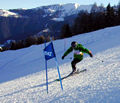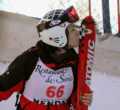|
Story
by Randy H. Milgrom
Audio by Matthew Quirk
Photography by Bob Garypie and
Peter Ottlakan
On
the Slopes:
One must be a serious and experienced
skier to even think about trying to manage gravity's pull
down the steep, shadowed piece of mountainside that constitutes
the Super-G slalom course at the 2001 Winter World Transplant
Games in Nendaz, Switzerland. And Susan Reiss and Tom Hobday,
Team USA teammates from Sacramento, California, easily qualify
on both counts.
Susan, 42, skies regularly in and around Lake Tahoe, Mammoth
Mountain, and other Northern California resorts, and this
is her fourth Winter Transplant Games following stints in
Aspen, Mammoth, and Snowbird. Tom, 58, taught skiing on weekends
for more than 20 years, and arrived in Nendaz poised to ski
in at least four different events following his Transplant
Games initiation at Snowbird two years ago. Competing this
morning in the Super Veteran category, Tom placed a healthy
fifth (following an impressive fourth place finish in yesterday
morning's Super Slalom race) in 1 min., 24 sec. -- just eight
seconds off the gold medalist's pace.
Hobday was casually mentioning that the track was slower
than he expected (as if it were possible to move at anything
other than an excessive rate of speed down this slope) when
his friend and fellow competitor, Swiss Team member Marc Vollenweider
-- a Mr. Clean look-alike, right down to the earring (though
Mr. Vollenweider sports many more than one) -- bounded over
in his ski boots asking about the morning's results. Tom was
able to give him the news that delighted them both: Mr. V
placed second!
As a Northern Californian, Susan has spent a good portion
of her lifetime on skis, and she says coming to Nendaz fulfills
a 'dream of a lifetime' to finally ski in Europe. She's been
having fun, as she always does at the Transplant Games --
'meeting other transplant recipients, and knowing that we
share something, is just so wonderful' -- but she was not
as certain about this morning's competition.
'Very stiff competition,' Susan says, smiling and shaking
her head. 'And a tough slalom course.' She thinks she'll decide
about entering other races on a day-to-day basis. 'Besides,'
she adds, 'this place is so beautiful. I want to have time
to explore.'
In
Marriage:
Tom Hobday's wife, Pam, is with him in Nendaz. She roams
the slopes exuberantly -- waving, shouting, and even hugging
and kissing many of those fortunate enough to cross her path.
Bob, of course, is the luckiest, since he carries a piece
of her everywhere. He got her kidney about five years ago.
'When I found out we were a match, I was thrilled!' Susan
says. They were living together at the time, but they weren't
married because their accountants had advised for financial
reasons that their union not be formalized.
'But after sharing body parts...' Susan laughed, and shrugged,
suggesting there would be nothing to stand in their way.
Tom had originally been diagnosed with a kidney ailment immediately
following his tour of active duty in Vietnam. A life insurance
policy purchased soon afterward required premium payments
based on his predicted demise at age 53 -- the year he received
Pam's kidney. Though Tom had always lived an active life,
a certain periodic caution and watchfulness was required;
in the last five years he's been cruising as never before.
'We called my kidney 'little pearl,'' Susan says about the
little ways she and her husband conspired to lighten up heavy
times. 'When I first saw him out on the slopes after the transplant,
I said, 'Little Pearl's having a lot more fun in his body
than she ever had in mine!''
As
Extended Family:
Susan Reiss received her new heart on December 23, 1989,
just before Christmas, and she recites the date the way many
organ recipients tend to: as a time that will never be forgotten.
Susan was in the peak of health, at age 31, when a bacterial
infection suddenly struck her. Within a month she had slowed
to a crawl. 'In three months time, I couldn't walk from here
to where I left my skis,' she says as she points to them,
dripping with water in the mid-morning sun, about seven feet
away.
Susan had waited, very sick, for 17 very long days, until
she received a donor heart. She had no idea who the donor
was, and for a long while had only a vague idea that she might
want to know.
Until the Winter Transplant Games at Snowbird.
'Suddenly, I had it in my mind that I wanted to win a medal
at the Games and award it to a member of my donor's family,'
Susan says. 'I wanted to be able to give them something.'
But she had no ready means of accomplishing that. She could
send a letter to the local organ procurement office, but a
reply was far from guaranteed.
Just one month before the Games, however, the procurement
office sent a letter to her. It was from her donor's mother.
She lived just 40 miles away in the Sacramento area, and
Susan had an emotional meeting with her before leaving for
Snowbird. Upon her return, she delivered to her one of the
two gold medals she won there. The picture taken during their
first-ever meeting sits on the mantel of the donor's mother's
home -- and the medal Susan won at Snowbird hangs over the
frame. Susan continues to call every three months or so, and
visits every Christmas.
Though both women had considered, from time to time, that
they might like to meet, it took them both ten years to act.
The mother's letter had referred to a moment of 'spiritual
reflection' that set her in motion.
Precisely the moment, perhaps, when Susan decided it was
time to meet her match, too.
|


















